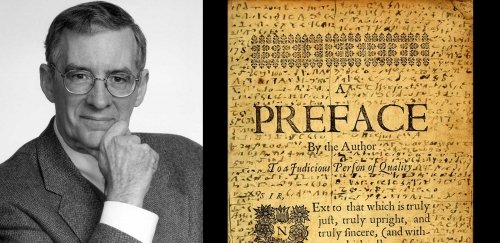Mysterious Writings by Roger Williams Deciphered After Almost Two Centuries
- News & Events
- News
- Mysterious Writings by Roger Williams Deciphered After Almost Two Centuries

RIC Professor Emeritus of History J. Stanley Lemons
Since 1817 many have tried and failed to decipher coded writing in the margins of a colonial-era book believed to have been written by Rhode Island founder Roger Williams.
The mystery was solved by a Brown University undergraduate student – Lucas Mason-Brown – with the help of RIC Professor Emeritus of History J. Stanley Lemons and Brown University Professor of History Linford Fisher.
According to the Associated Press, historians call the now-readable essay by Williams the most significant addition to his scholarship in a generation or more. The essay was published this month in a book titled “Decoding Roger Williams: The Lost Essay of Rhode Island’s Founding Father” (Baylor University Press, 2014), co-authored by Lemons, Fisher and Mason-Brown.
Lemons retraced the origin of the mystery and how it was solved.
He said, in 1817 Nicholas Brown Jr., the man for whom Brown University was named, acquired a 250-page paperback titled “An Essay Towards the Reconciling of Differences Among Christians.” Every inch of the book’s margins and white space was scrawled with indecipherable words and symbols. When the John Carter Brown (JCB) Library at Brown University was built in 1905, the book was added to the collection accompanied by a letter stating that Roger Williams was the author of the marginal notes.
“But there was no way to prove it without decoding the notes, which no one was able to do,” Lemons said.
Dubbed “The Mystery Book,” the text languished in the archives of the library for the next century until former Library Director Edward Widmer invited a committee of Brown faculty to crack the code.
When they failed, Widmer invited a team of Brown undergraduate students to take on the challenge in 2011. Among them was junior math major Lucas Mason-Brown who would become the primary decoder on the project.
Mason-Brown had his first major breakthrough when he learned that Williams had been trained in shorthand as a boy. He was able to figure out that the notes were a 17th-century version of shorthand.
“Mason-Brown is brilliant. Others have tried to figure that out for centuries,” said Lemons.
But that wasn’t the only problem for the young mathematician. To complicate matters, Roger Williams had made up his own symbols for words. “For example, his word for friendship was the letter ‘f’ next to a drawing of a boat,” Lemons said. “Eventually Mason-Brown compiled a dictionary of over 1,000 frequently occurring terms in Williams’ writing.” By 2012 he had cracked the majority of the code through a combination of cryptology and consultation with other specialists.
“Lucas was sent to me by Widmer because Widmer knew I was an expert on Roger Williams and Lucas had questions about how to interpret the text,” Lemons said.
Mason-Brown determined that there are three separate writings in the book. Two sections are notes Williams jotted down from books by other authors – one on cosmography and the other a medical encyclopedia. The third – and most intriguing – section is 20 pages of Williams’ original thoughts on a major theological issue of the day: infant vs. adult baptism.
“When Lucas sat with me, he would ask me to explain religious terms, such as, the meaning of ‘dipping’ and ‘the covenant of grace’,” Lemons noted. Included in the newly released “Decoding Roger Williams,” is an essay by Lemons on the issue of baptism, along with an essay by Fisher on the conversion of Indians to Christianity and a section by Mason-Brown on his process of decoding the material.
One might ask why Williams would write notes in a printed book rather than on paper. “In one word, ‘scarcity,’” Lemons said. “Paper was not made in America. It had to be imported from England. Rather than use good paper to take down notes, Williams used the white space of this book as a notepad.”
Lemons served as professor of history at Rhode Island College for 39 years and is the only faculty member to have been awarded all three of the principal awards for scholarship, teaching and service in the Division of Arts and Sciences. He has twice been recognized by the American Association of State and Local History with the Award of Merit (their highest award) for his contributions to Rhode Island history. Lemons is author of eight books and is currently beginning work on a history of Baptists in Rhode Island.
